Salesforce Service Cloud is one of the best ticketing systems but it may not be it for everyone. Maybe your team finds it too complex or expensive, or your needs have changed. If you’re looking for other options, there are plenty available.
Many alternatives offer different features, prices, and user experiences so you can find the right fit for your business. Look at some top alternatives and their strengths compared to Salesforce Service Cloud.
Exploring alternatives allows you to tailor your support system to your specific requirements. Whether you need better integration capabilities, more straightforward usability, or specialized features, there is a ticketing system out there that can enhance your customer support operations and align perfectly with your business goals. Below, you’ll find a table outlining these alternatives, followed by a brief explanation of each.
Top 9 Salesforce Service Cloud Alternatives
Company | Top Features | Average Rating (Gartner, G2 & Capterra) | Pricing (Per month) |
LeadSquared's Service CRM | AI Automation & integration with Sales CRM | 4.38 | Upon Request |
Zendesk Service Suite | Third-party integrations & Efficient ticket management | 4.27 | $49 |
Zoho Desk | Omnichannel Support & In-App Integration | 4.42 | $12 |
Jira Service Management | Integration with Atlassian's ecosystem & Customized options for users | 4.45 | $20 |
Freshdesk | Easy to navigate for agents & customers, Customer support via email, social media, and phone can be provided. All customer interactions can be managed in one place | 4.43 | $15 |
HubSpot | Automation capabilities & integration with HubSpot CRM | 4.37 | $45 |
Intercom | Conversational support tools & automated messaging and targeting capabilities | 4.53 | $39 |
BoldDesk | Easy Set-up & Configurations | 4.2 | $25 |
Kayako | Omnichannel Support with integrated live help desk | 4.42 | $15 |
1. Leadsquared’s Service CRM
Website Link: LeadSquared
LeadSquared’s Service CRM transforms customer support with advanced features like Parent-Child Ticketing, Omnichannel Support, and a 360-degree Customer View. Seamlessly integrating sales and service solutions enables ticket co-ownership and automates redundant tasks, ensuring efficient and personalised service delivery.
Why choose LeadSquared over Salesforce Service Cloud?
LeadSquared stands out as a strong alternative to Salesforce. It offers powerful omnichannel support and smooth CRM integration for tailored services, providing a full 360-degree view of your customers. With advanced features such as Parent-Child Ticketing, Ticket Co-Ownership, and AI-powered automation to simplify tasks and speed up resolutions, LeadSquared enables your team to deliver outstanding service and boost customer satisfaction.
Pros:
- High-level automation that simplifies the ticketing process.
- Great ticket management features.
- Customer Testimonial: I’ve been using Leadsquared for almost 2 years now, and I truly like the features. We can make changes to our chat, phoning, and note-taking activities.
Cons:
- Limited customization options compared to some competitors.
- Can be difficult for new users to understand.
- User Feedback: I guess its interface for a first-time user can be a bit overwhelming as it is not the simplest.
Pricing:
Upon request
Ratings:
- G2: 4.3/5
- Capterra: 4.5/5
- TrustRadius: 8.7/10
2. Zendesk Service Suite
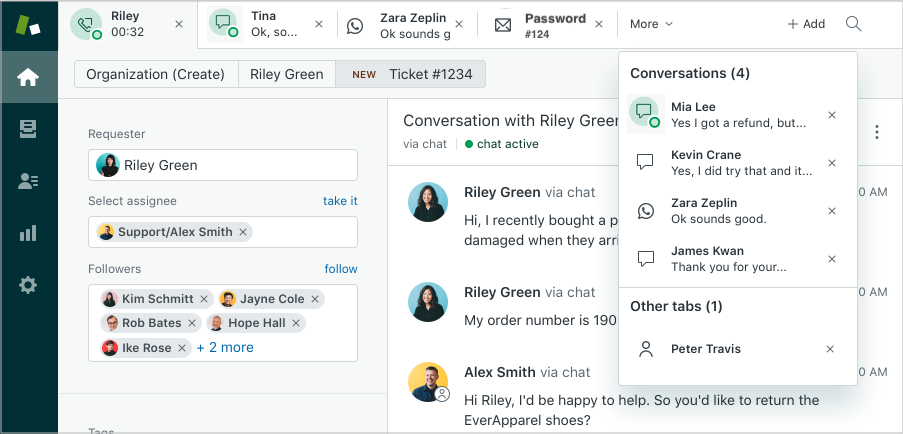
Website: Zendesk
Zendesk is renowned for its comprehensive suite of customer service features, particularly its robust and adaptable ticketing system, which excels at managing customer interactions across diverse channels. This platform offers various advanced features that significantly enhance the customer support experience.
Why choose Zendesk over Salesforce Service Cloud?
Zendesk offers a feature-rich platform with multi-channel support, customizable ticketing, powerful automation, robust knowledge management, advanced analytics, and easy integrations. These capabilities make Zendesk a compelling choice over Salesforce Service Cloud for businesses seeking efficient and comprehensive customer service solutions.
Pros:
- Integrates with numerous third-party applications for a unified customer view.
- Powerful tools to manage tickets efficiently and gain valuable insights.
- Customer Testimonial: Zendesk is a tool that offers multiple options in a single platform. I use Zendesk for support tickets, knowledge-based articles, and user conversations.
Cons:
- Cost: Can be expensive with additional features and add-ons.
- Complexity: Some users find the interface and settings complicated.
- User Feedback: The biggest drawback for me is that agents can’t open an attached file from the ticket page. If you click on the attachment, it immediately downloads. That confuses my agents. When right-clicking on an attachment, there is no option to “view” or “open with.”
Pricing:
Starts at $49 per agent per month.
Ratings:
- G2: 4.3/5
- Capterra: 4.3/5
- TrustRadius: 8.4/10
3. Zoho Desk
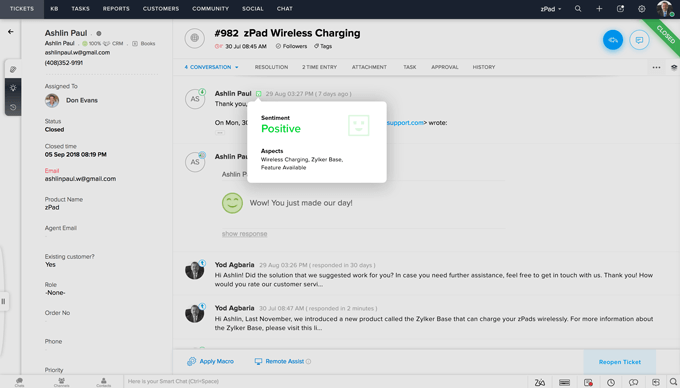
Website: Zoho Desk
Zoho Ticketing System provides solutions for managing customer support tickets. It integrates with Zoho’s suite of applications, making it a versatile choice for businesses looking for an all-in-one CRM and support system.
Why choose Zoho over Salesforce?
Zoho offers a more cost-effective and integrated approach with its CRM suite. Zoho’s ticketing system is designed to work seamlessly with other Zoho applications, providing a unified platform for managing all aspects of customer relationships.
Pros:
- Seamless integration with Zoho’s suite of applications.
- Comprehensive CRM features that extend beyond ticketing.
- Customer Testimonial: The interface is clean and easy to navigate, making it simple for me to manage all customer inquiries and tickets in one place. I also appreciate the automation features that save time and streamline the support process. Another aspect that I enjoy about Zoho Desk is its customizable workflows and ticket escalation rules.
Cons:
- Limited third-party integrations compared to Salesforce.
- Can be overwhelming for users new to the Zoho ecosystem.
- User Feedback: The sandbox should include test agents, a step-by-step setup guiding an Admin through every part of the Zoho Desk process, from workflows to automation, and providing best practices.
Pricing:
Starts at $14 per agent per month.
Ratings:
- G2: 4.2/5
- Capterra: 4.4/5
- TrustRadius: 8.2/10
4. Jira Ticketing System
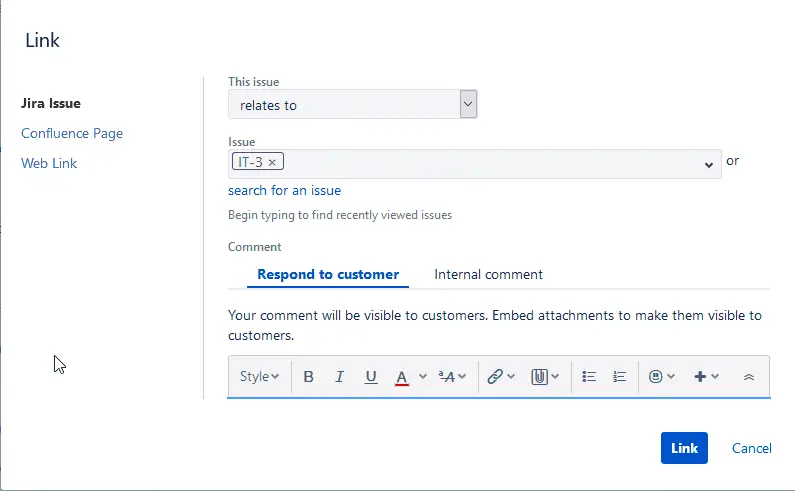
Website: Atlassian
Jira Ticketing System is known for its powerful issue and project-tracking capabilities, making it an excellent choice for software development and IT teams due to its ITSM capabilities. It provides a flexible and robust platform for managing customer support tickets and workflows.
Why choose Jira over Salesforce?
Jira excels in project management and issue tracking, particularly for technical teams. Jira’s ticketing system is designed to streamline workflows and enhance collaboration within development and IT environments.
Pros:
- Strong project management and issue-tracking capabilities.
- Highly customizable workflows to fit various team needs.
- Customer Testimonial: The best thing I like about Jira is its ticket management system. The tickets are so well organised. In proper different stages, to-do, in progress, in review and the different stages created by client/business owner.
Cons:
- More complex setup and learning curve compared to Salesforce.
- Not as comprehensive in CRM functionalities.
- User Feedback: As a fresher, there were some difficulties that I faced in understanding where to look for past tickets or who else worked on the key that I was assigned to, as well there could be an internal chat feature that would save a lot of time for the uses who has to wait for the client to reply on a comment.
Pricing:
Starts at $10 per user per month (Per agent).
Ratings:
- G2: 4.2/5
- Capterra: 4.4/5
- TrustRadius: 8.3/10
5. Freshdesk
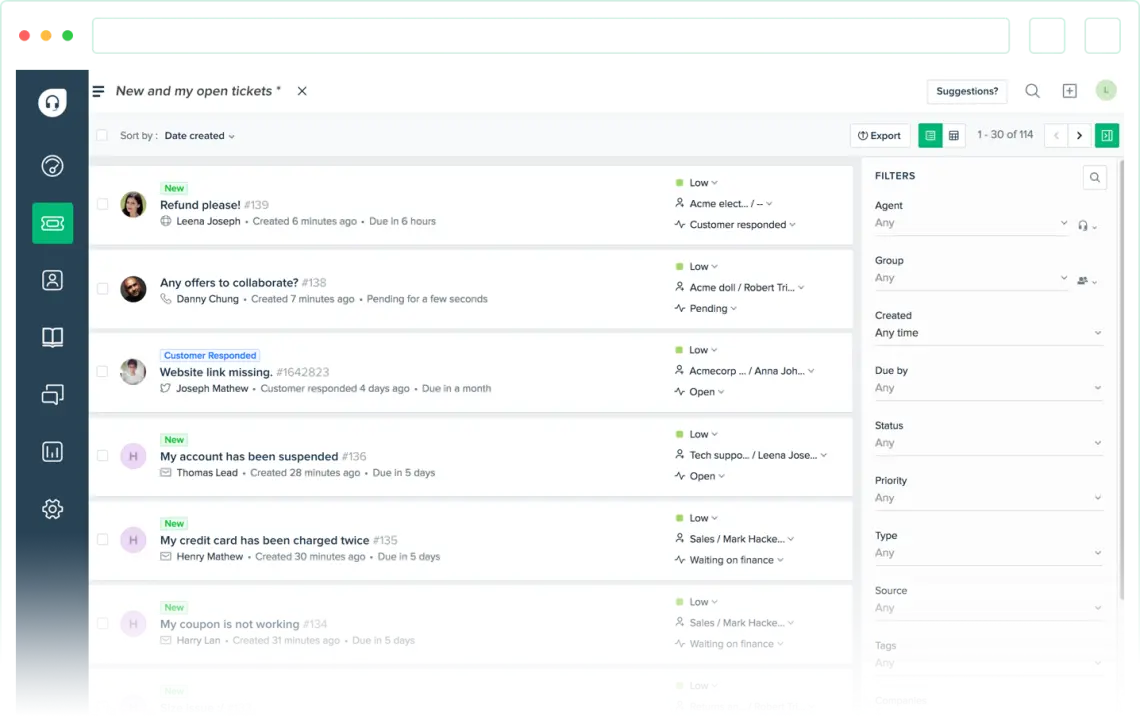
Website: Freshdesk
Freshdesk offers a comprehensive ticketing system to enhance customer support across various channels. It provides a user-friendly platform that simplifies managing customer interactions and improving support efficiency.
Why choose Freshdesk over Salesforce?
Freshdesk focuses on delivering exceptional customer support. Its ticketing system streamlines operations with multi-channel support, managing interactions across email, chat, phone, and social media. Freshdesk offers extensive customisation, powerful automation, a robust knowledge base, and collaboration tools. It also provides detailed analytics and reporting and integrates seamlessly with various third-party applications and systems.
Pros:
- Intuitive interface that is easy to navigate.
- Extensive automation features to streamline support tasks.
- Customer Testimonial: Freshdesk is very easy to use and configure and you can begin accepting tickets from your customers quite quickly after purchasing or starting a trial. Since Freshdesk is a cloud-based solution, there are no hardware implementation requirements to budget for. We could easily integrate with our existing Office 365 mailboxes to receive and respond to tickets through integrations included with Freshdesk, which made the process very easy.
Cons:
- Occasional performance issues during peak usage times, which can lead to slower response times and decreased productivity
- Can become costly with additional features and add-ons.
- User Feedback: Freshdesk can be a bit pricey when compared to it’s competitors
Pricing:
Starts at $15 per agent per month.
Ratings:
- G2: 4.4/5
- Capterra: 4.5/5
- TrustRadius: 8.6/10
6. HubSpot
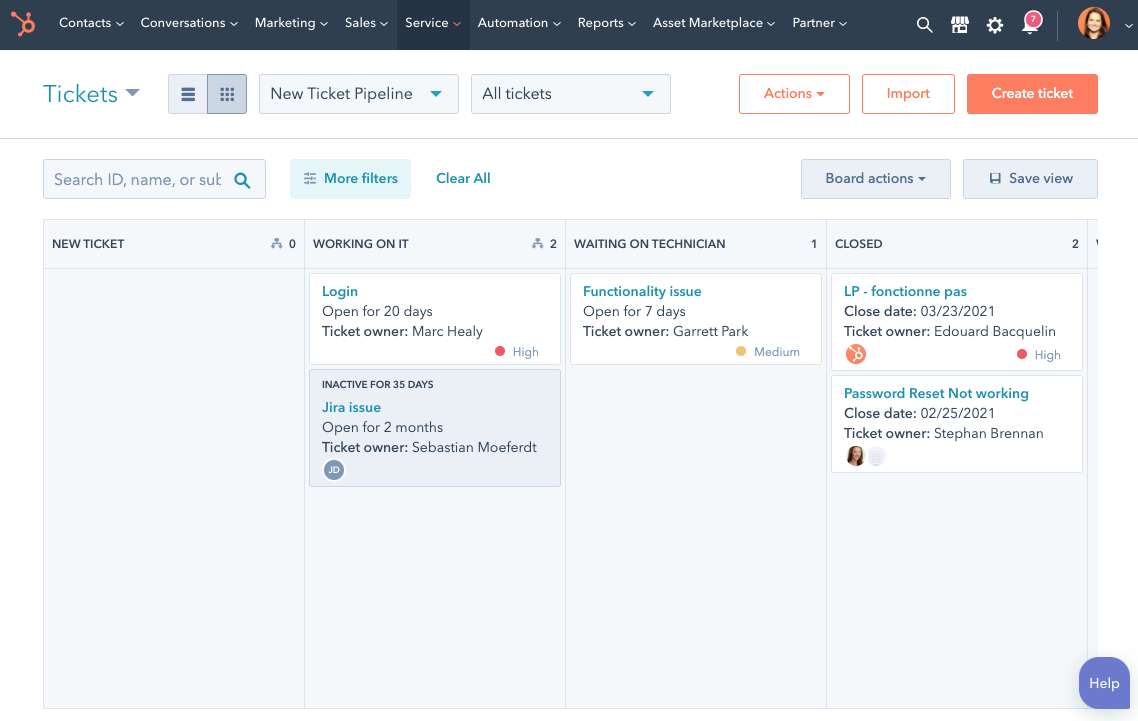
Website: HubSpot
HubSpot’s Ticketing System is part of its comprehensive Service Hub, designed to enhance customer service and streamline support processes. It seamlessly integrates with HubSpot’s marketing and sales tools, providing a unified platform for managing customer interactions.
Why choose HubSpot over Salesforce?
HubSpot offers a more user-friendly and integrated experience, particularly for small to medium-sized businesses. HubSpot’s ticketing system is designed to work effortlessly with its other tools, making it easier to manage customer support alongside marketing and sales activities.
Pros:
- Seamless integration with HubSpot’s marketing and sales tools.
- User-friendly interface that’s easy to navigate.
- Customer Testimonial: Service Hub is scalable and pretty intuitive to navigate. It also offers plenty of online assistance for additional customisation and a responsive chatbot and support team where needed. I’ve found it easy to get started at the level that’s right for our needs right now and offer a path to more features as we grow our service offering.
Cons:
- Limited customization options compared to Salesforce.
- A con of HubSpot’s ticketing system is its reliance on the HubSpot ecosystem, making integration with other tools challenging and potentially leading to fragmented workflows.
- User Feedback: The only thing that I don’t like is the merging feature of HubSpot. I don’t like how it simply removes the existence of a standalone ticket and just paste the contents in the new parent ticket. I experienced merging multiple tickets since they had the same issue, but the content was too much since I had to scroll over so many times to find what I needed. I wish they could let us preview the thread before the merge.
Pricing:
Starts at $45 per month for two users.
Ratings:
- G2: 4.4/5
- Capterra: 4.5/5
- TrustRadius: 8.6/10
7. Intercom
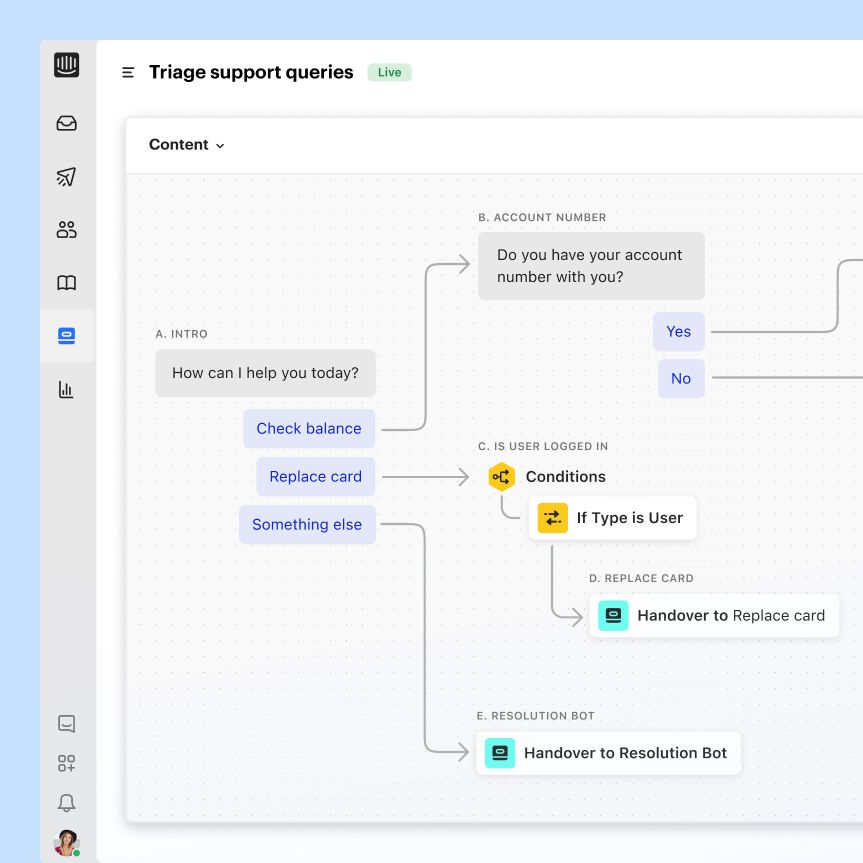
Website: Intercom
Intercom’s Ticketing System is known for its modern messaging approach. It provides an efficient platform for customer support through real-time chat and automated workflows. It excels at offering personalized customer interactions and streamlining communication.
Why choose Intercom over Salesforce?
Intercom specializes in delivering a modern, conversational support experience. Its ticketing system focuses on real-time messaging, making it ideal for businesses that prioritize instant and personalized customer communication.
Pros:
- Excellent real-time chat and messaging capabilities.
- Intuitive interface with robust automation features.
- Customer Testimonial: What I like best about Intercom is that it has categories wherein you can easily see what are the new messages and the old ones. It also provides easier navigation for the user. I often use intercom because it is great for business and entrepreneurial experiences. Providing customer support has been manageable and light because of having intercom by my side.
Cons:
- The emphasis on live chat can lead to challenges in managing and prioritizing tickets that do not require immediate responses
- Can be costly with advanced features and higher user tiers.
- User Feedback: Some latest feature releases were not as good as they could be but at least they’re working on them.
Pricing:
Starts at $59 per month for essential features.
Ratings:
- G2: 4.4/5
- Capterra: 4.5/5
- TrustRadius: 8.5/10
8. BoldDesk
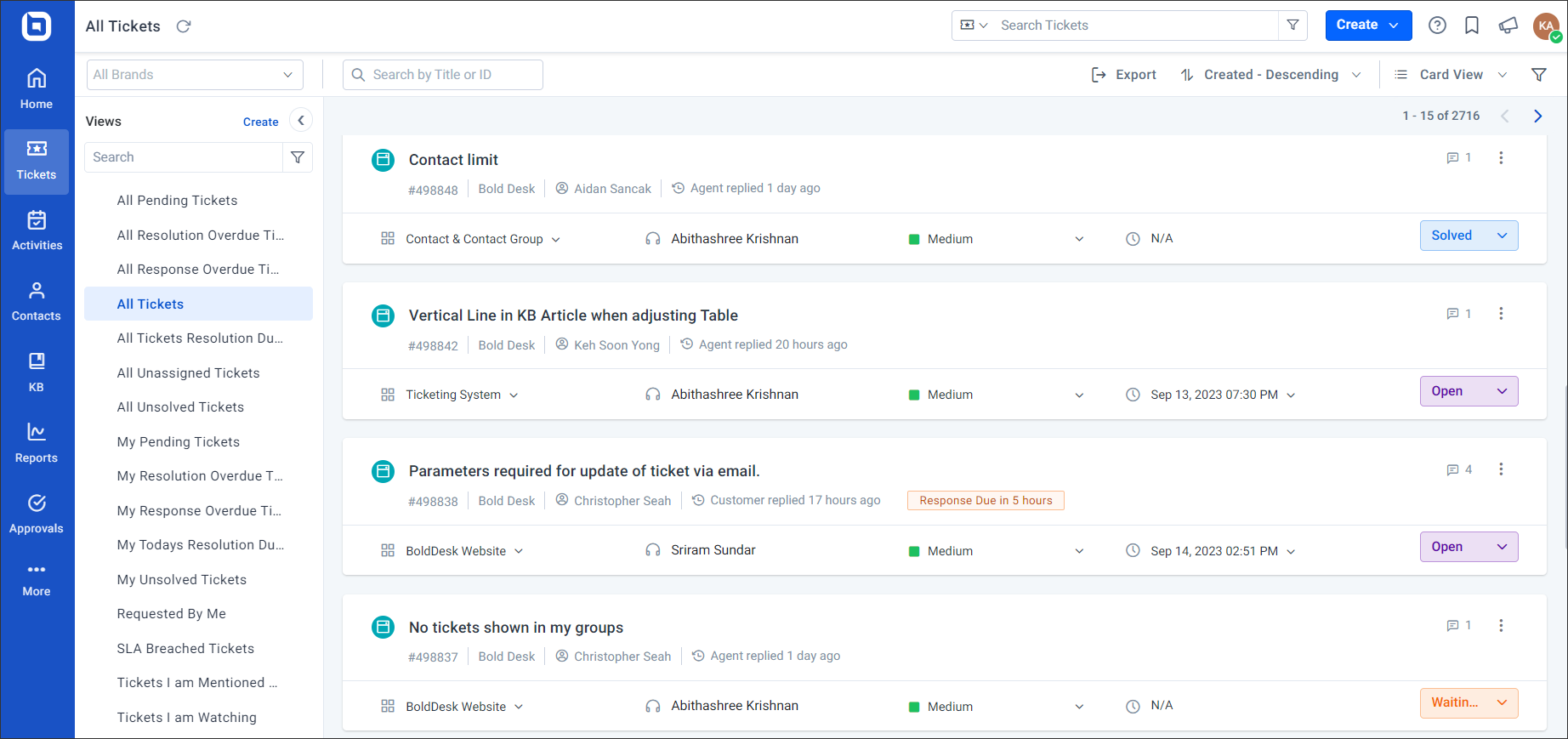
Website: Bolddesk
BoldDesk’s Ticketing System is a dynamic customer service solution with a streamlined interface and advanced ticket management tools. It is designed to efficiently handle customer inquiries and support tickets, improving the speed and quality of customer service interactions.
Why choose BoldDesk over Salesforce?
BoldDesk focuses specifically on customer support, offering a simpler and more tailored solution for managing support tickets. This focus allows for quicker setup and more efficient management of customer interactions.
Pros:
- Streamlined ticket management system that simplifies the support process.
- User-friendly interface that facilitates quick adoption and ease of use.
- Customer Testimonial: BoldDesk has been the only ticketing system I have tried to offer the functions necessary for a small IT team with a clear-cut division of responsibilities. Creating tasks and subtasks out of tickets, linking the ticket with an excellent parent- and child-ticket system, creating many possibilities for automatization, and using AI features to take some of the writing burdens.
Cons:
- A significant drawback of BoldDesk’s ticketing system is its limited flexibility in customization for unique business workflows.
- Fewer integrations with third-party applications than Salesforce.
- User Feedback: “The complexity makes it rather easy to lose track of all the features at your disposal. Managing a multilingual service desk can be clunky, requiring one to do a lot of the work more than once”
Pricing:
Starts at $10 per agent per month.
Ratings:
- G2: 4.1/5
- Capterra: 4.2/5
- TrustRadius: 8.1/10
9. Kayako
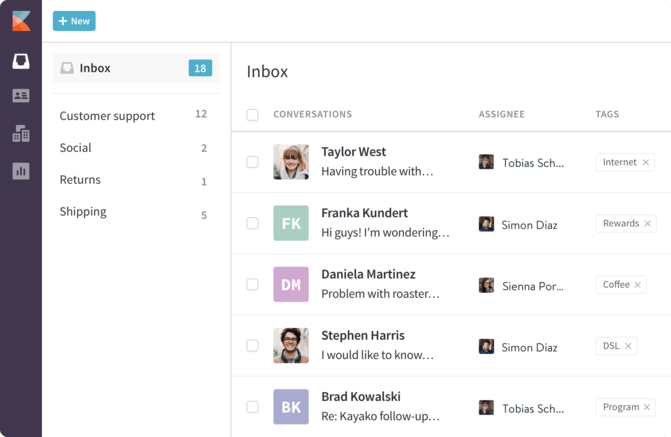
Website: Kayako
Kayako’s Ticketing System excels in customer service with features like Ticket, Incident, Problem, and Complaint management. It includes customizable fields, a Knowledgebase, and a handy Survey system for Event-Driven Surveys. The fast system focuses on essential tasks and offers a fully customizable web interface.
Why choose Kayako over Salesforce?
While Salesforce offers extensive CRM functionalities, Kayako focuses on delivering specialized customer support. It provides efficient tools like customizable fields, a Knowledgebase, and a Survey system for direct customer engagement. Kayako’s fast, streamlined interface and excellent service team ensure quick resolution of queries and issues.
Pros:
- Dedicated customer support tools that provide direct and personal customer interactions.
- Easy-to-use interface that enhances the efficiency of support teams.
- Customer Testimonial: Easy and smooth ticketing platform. It feels lightweight, and the loading time and user interface are very good.
Cons:
- Limited integration options with external systems compared to Salesforce.
- User Feedback: There are some bugs that happen in Kayako from time to time, which interfere with assigning priority. It can be made better by issuing an updated software patch. Other than that, the software is really good!
Pricing:
Starts at $30 per agent per month.
Ratings:
- G2: 4.0/5
- Capterra: 4.3/5
- TrustRadius: 8.0/10
Experience the Power of LeadSquared’s Service CRM
Finding the perfect ticketing system can feel like searching for a unicorn – powerful, feature-rich, and tailored to your business needs. While Salesforce Service Cloud is a familiar name, it isn’t a one-size-fits-all solution.
LeadSquared’s Service CRM is a standout that goes beyond basic ticketing systems. Imagine a unified platform where every customer interaction, from the initial ticket to resolution, is meticulously tracked and easily accessible. LeadSquared Service CRM provides this seamless experience and more, integrating with your existing CRM data to offer a complete view of your customers.
Here’s why LeadSquared Service CRM stands out:
Effortless Integration: LeadSquared connects seamlessly with your CRM, breaking down data silos and giving agents complete customer histories at their fingertips.
AI for Efficiency: With AI-powered automation, LeadSquared streamlines workflows, handling repetitive tasks so your agents can focus on complex issues and stronger customer relationships.
Comprehensive Features: Enjoy self-service portals, knowledge base management, and omnichannel support all within a single platform.
LeadSquared’s Service CRM transforms customer support with advanced features like Parent-Child Ticketing, Omnichannel Support, and a 360-degree Customer View. By seamlessly integrating sales and service solutions, it enables ticket co-ownership and automates redundant tasks, ensuring efficient and personalized service delivery.
Before choosing a new solution, think about your needs. Do you need a platform that can handle complex tasks? Or do you need an easy-to-use interface with good automation? Knowing your must-have features, budget, and team size will help you find the best option. With these in mind, you can explore other customer service software and find one that helps your team provide great service.
Ready to see the LeadSquared difference?
Book a demo now and experience a new level of customer support!









